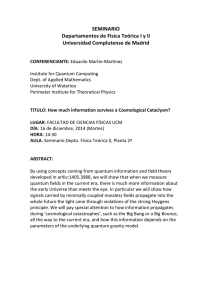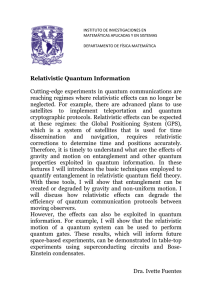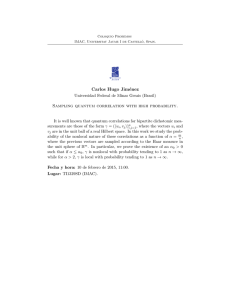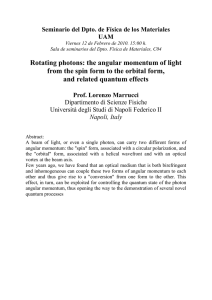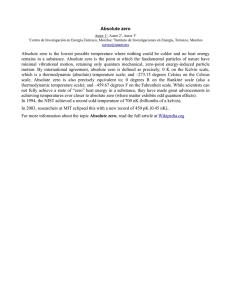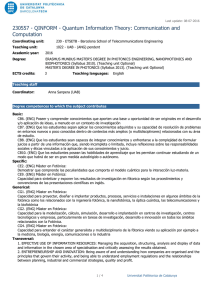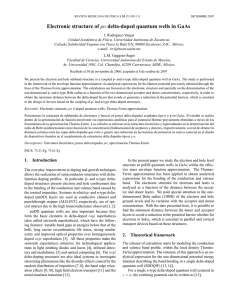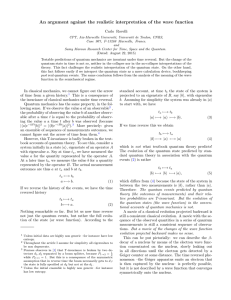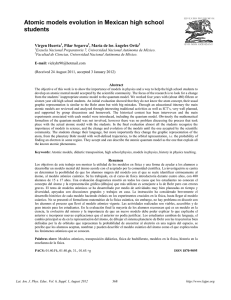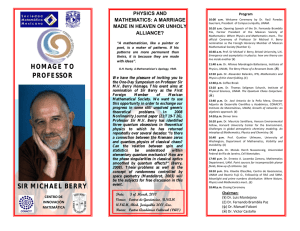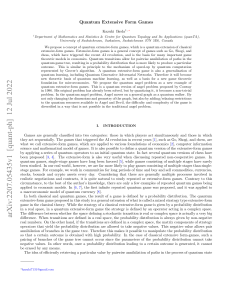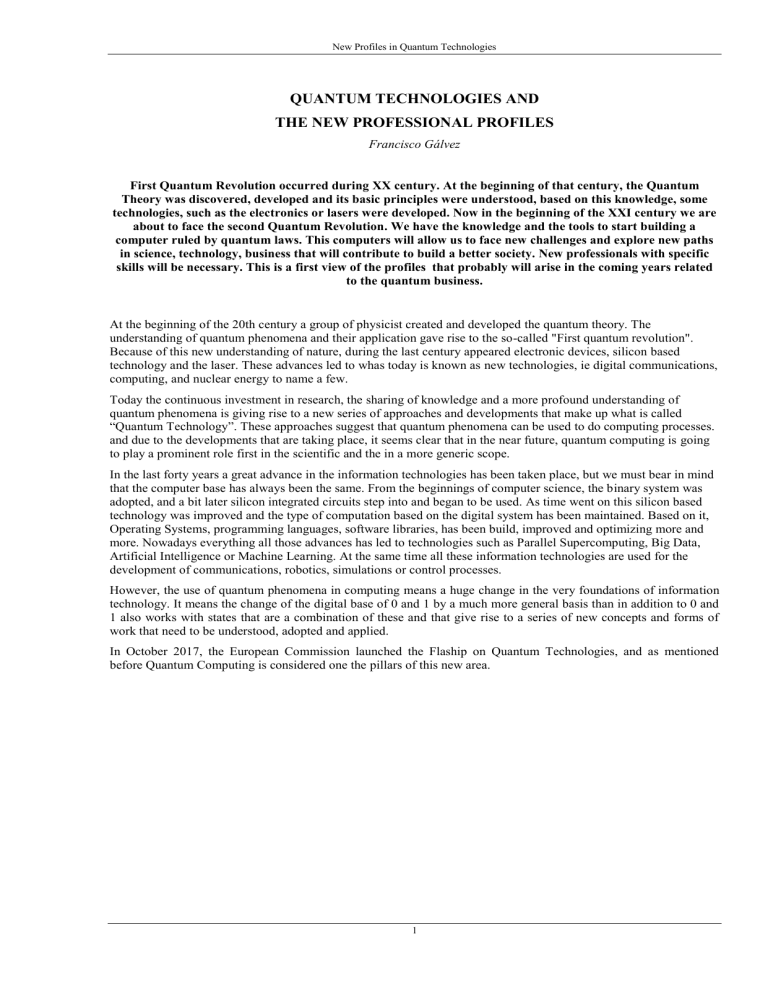
New Profiles in Quantum Technologies QUANTUM TECHNOLOGIES AND THE NEW PROFESSIONAL PROFILES Francisco Gálvez First Quantum Revolution occurred during XX century. At the beginning of that century, the Quantum Theory was discovered, developed and its basic principles were understood, based on this knowledge, some technologies, such as the electronics or lasers were developed. Now in the beginning of the XXI century we are about to face the second Quantum Revolution. We have the knowledge and the tools to start building a computer ruled by quantum laws. This computers will allow us to face new challenges and explore new paths in science, technology, business that will contribute to build a better society. New professionals with specific skills will be necessary. This is a first view of the profiles that probably will arise in the coming years related to the quantum business. At the beginning of the 20th century a group of physicist created and developed the quantum theory. The understanding of quantum phenomena and their application gave rise to the so-called "First quantum revolution". Because of this new understanding of nature, during the last century appeared electronic devices, silicon based technology and the laser. These advances led to whas today is known as new technologies, ie digital communications, computing, and nuclear energy to name a few. Today the continuous investment in research, the sharing of knowledge and a more profound understanding of quantum phenomena is giving rise to a new series of approaches and developments that make up what is called “Quantum Technology”. These approaches suggest that quantum phenomena can be used to do computing processes. and due to the developments that are taking place, it seems clear that in the near future, quantum computing is going to play a prominent role first in the scientific and the in a more generic scope. In the last forty years a great advance in the information technologies has been taken place, but we must bear in mind that the computer base has always been the same. From the beginnings of computer science, the binary system was adopted, and a bit later silicon integrated circuits step into and began to be used. As time went on this silicon based technology was improved and the type of computation based on the digital system has been maintained. Based on it, Operating Systems, programming languages, software libraries, has been build, improved and optimizing more and more. Nowadays everything all those advances has led to technologies such as Parallel Supercomputing, Big Data, Artificial Intelligence or Machine Learning. At the same time all these information technologies are used for the development of communications, robotics, simulations or control processes. However, the use of quantum phenomena in computing means a huge change in the very foundations of information technology. It means the change of the digital base of 0 and 1 by a much more general basis than in addition to 0 and 1 also works with states that are a combination of these and that give rise to a series of new concepts and forms of work that need to be understood, adopted and applied. In October 2017, the European Commission launched the Flaship on Quantum Technologies, and as mentioned before Quantum Computing is considered one the pillars of this new area. 1 New Profiles in Quantum Technologies Quantum Computing. It is the most impressive technology. Currently there are several prototypes of quantum computer in execution and it has already been demonstrated that the execution of quantum algorithms in these systems can suppose a great advantage with respect to the execution of classic programs on classic computer technology. The development of more robust and scalable quantum computers, as well as algorithms and useful programs is one of the biggest technological challenges at present. Quantum Communication. Current communications uses encryption techniques that can be broken by quantum computing techniques. This led to the need of creation and development of the so-called post-quantum encryption that is, a set of encryptions techniques that will be immune to attacks from a quantum computer. Currently there are already some solutions of this type in the market. Quantum Simulation. One of the uses of current supercomputers is the realization of simulations that recreate processes or environments for its detailed and controlled study. However, the simulation of processes and environments with quantum behavior and with some complexity is beyond the reach of the simulation performed by supercomputers. The quantum simulators are assemblies that emulate the behavior of real quantum systems such as a set of electrons, atomic particles or chemical bonds and enable the study of them under controllable parameters. This allows to investigate phenomena such as superconductivity, chemical reactions, atomic and nuclear processes, biological processes, etc. Quantum Sensoring and Metrology. The quantum states are very sensitive to any signal or alteration of the environment. This characteristic makes them very appropriate to be used as sensors and measuring devices. The superposition and the coherence of quantum states are unique quantum features that can be exploited in the construction of interferometers, solid state sensors, or quantum imaging devices that improve the quality and accuracy of current devices. The adoption of these new technologies, is going to be a major change in the current technological landscape. Therefore, engineers and professionals working in information technologies need to arm themselves with the knowledge necessary to understand and work in this new field. To carry out this second quantum revolution, new profiles are needed. The new profiles have to be able of investigate, advise, implement and develop projects in quantum technologies. These new profiles should understand and manage the advances and technical know-how in Quantum Technologies, and herein they must transform knowledge in applicable engineering, both in the form of devices and processes. They will have to add value from this new quantum engineering and enable ways to make it profitable for society. At the dawn of this new technological stage you can already forsee a series of profiles: Quantum Scientist. This profile has deep scientific skills and is an expert in quantum theory and technology. Currently this profile is located in physicists and engineers who work in the area of computation and quantum technologies from the experimental point of view. His working environment is mainlyl the laboratory and research departments of enterprises. The tasks are the design and optimization of experiments, devices and processes of quantum nature in order to generate scientific knowledge, to open new lines of research and to promote the development of the technology. The Quantum Scientist is a highly specialized profile in a specific technology or area of knowledge and must be able to transmit and communicate fluently, and have technical leadership skills to drive and sustain new research projects. Also collaboration with other research teams from all over the world is a desirable skill. In collaboration with the engineers the Quantum Scientist will work to bring the results of their experiments to their practical implementation in the industrial world. 2 New Profiles in Quantum Technologies Quantum Advisor. The Quantum Advisor has a wide knowledge of quantum technology, as well as a business vision with technological projection. A Quantum Advisor works in colaboration with Quantum Engineers to be able to validate solutions that use quantum technologies. Knowledge of quantum mechanics, optical technologies, solid state and information technology is necessary with practical applications in perspective. A Quantum advisor must be able to transmit and explain quantum technology to a non-expert audience. The task of the quantum advisor is to advise companies on the convenience and advantages derived from the use of quantum technologies for the development or improvement of their business processes. Quantum Engineer. Este This profile has a deep and detailed understanding of quantum technology and can configure and design valid and efficient solutions for specific problems. He must have a dialogue with the Quantum Scientist and being able to understand the results and the knowledge generated in the labs. A Quantum Engineer may be specialized in a field of knowledge or quantum technology, but he must be able to link to and combine different quantum technologies with conventional technologies to make global designs that solve complex situations. At the same time, as an engineer, he should apply project control and execution techniques that guarantee successful execution. A mastery of quantum mechanics, electronics, photonic systems, nanotechnology and information technologies is required. In summary the goal of a quantum engineer is to plan, design and carry out projects that make use of quantum technologies. . Quantum Developer. The Quantum Developer profile is the equivalent of a systems programmer or application developer. It is someone with the knowledge necessary to develop a program that works on a simulator or a quantum processor. A Quantum Developer is able to develop programs and routines using the quantum circuit model and using the available programming techniques at their fingertips. The developer must also know the fundamental concepts in quantum mechanics. The scope of action of a quantum developer is Quantum Computation and therefore it is required a deep knowledge of systems programming as well as a good knowledge of quantum mechanics It is therefore necessary to enable or modify the educational plans to accommodate new contents that enable the creation of the aforementioned profiles. So far, the knowledge related to quantum phenomena have been almost exclusive of physics degrees, but now on, we must expand this knowledge to other studies in the area of engineering and information technology, and at the same time, begin to include it earlier and stepwise in secondary education schools. Francisco J. Gálvez Ramírez fjgramirez@gmail.com Degree in Fundamental Physics (Univ.of Valencia) Master in Advanced Physics (Univ.of Valencia) 3
